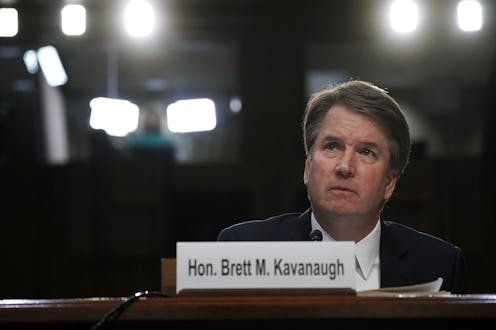News
Trump’s SCOTUS Nominee Responds To Backlash About His Comment On Birth Control

The Senate will probably vote on President Donald Trump's Supreme Court nominee in about a week, but the controversy surrounding him shows no sign of receding. On Thursday, Brett Kavanaugh said his recent "abortion-inducing drugs" comment wasn't describing his own opinion. In a 23-page document sent to the Senate Judiciary Committee, he responded to some final questions from senators before his confirmation.
"That was the position of the plaintiffs in that case, and I was accurately describing the plaintiffs' position," Kavanaugh wrote in the document in response to a question from Sen. Chuck Grassley (R-IA). "At the hearing, I was not expressing an opinion on whether particular drugs induce abortion; I used that phrase only when recount[ing] the plaintiffs' own assertions."
During the hearing on Sept. 6, Sen. Ted Cruz (R-Texas) asked Kavanaugh to describe his position on a 2015 case that involved allowing employees to opt out of providing health insurance coverage for contraception. Kavanaugh replied by saying that he believed the current opt-out form posed an unfair burden for employees: "They said filling out the form would make them complicit in the provision of the abortion-inducing drugs that they were, as a religious matter, objected to."
Women's reproductive rights advocates immediately jumped on the phrase "abortion-inducing drugs," pointing out that using birth control is not the same as getting an abortion. Sen. Kamala Harris (D-California) and Hillary Clinton are among those who were alarmed by Kavanaugh's comment; both argued that it was meant as a "dog whistle" to radical conservatives.
Kavanaugh's statement on Thursday is unlikely to satisfy all his critics. Later in the document, Sen. Mazie Hirono (D-Hawaii) brought up the issue again and took a different tactic. She didn't want to know whether or not Kavanaugh had meant to describe his own opinion in that moment — she wanted to know what his opinion was.
"Regardless of whether the term 'abortion-inducing drugs' was used by a party," she wrote, "do you believe that birth control or contraceptives are 'abortion-inducing drugs'?"
But Kavanaugh declined to answer the question. Instead, he repeated his response to Grassley, saying that he'd been describing the plaintiff's opinion.
That evasiveness has been typical of Kavanaugh's statements during his confirmation hearings. Some have argued that this is a normal and appropriate way for SCOTUS nominees to act, while others have argued that he's using the tactic to avoid showing the country that he'll enter the court with an activist conservative agenda.
Democrats consider his ambiguity on Roe v. Wade to be one of the biggest warning signs. He's repeatedly said that he considers the 1973 abortion rights case to be "settled precedent," but a 2003 email that was leaked to The New York Times suggests otherwise. In that exchange, he wrote that "I am not sure that all legal scholars refer to Roe as the settled law of the land at the Supreme Court level since Court can always overrule its precedent, and three current Justices on the Court would do so." And it's true — as members of the highest court in the country, the justices could rule that a previously "settled" case was wrongly decided and create a new "precedent."
If Kavanaugh thought that his responses to Grassley and Hirono would mollify critics, he's surely wrong.